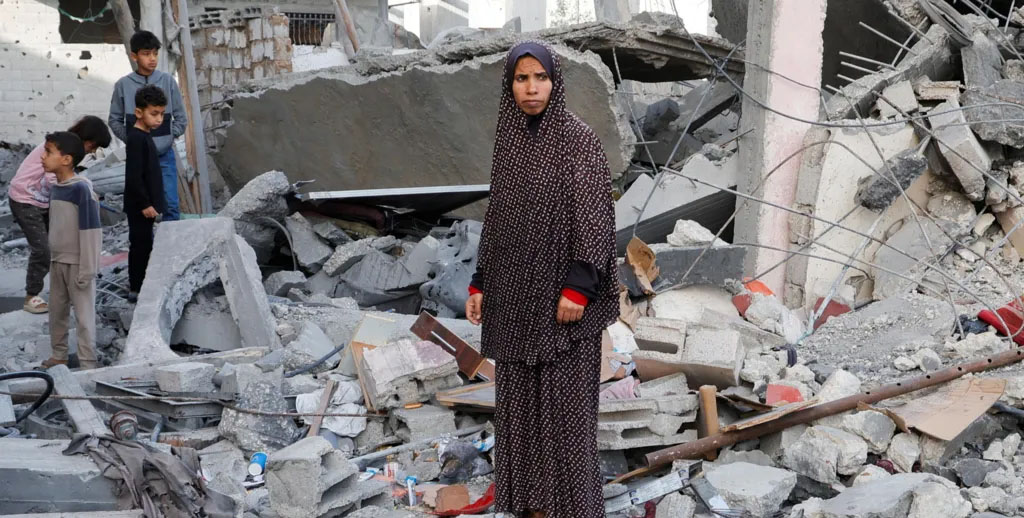International
Woman drugs husband, burns house in scheme to gain more money

Woman drugs husband, burns house in scheme to gain more money
An Iowa nurse had one final act of desperation to keep her husband from divorcing her and to cash in on life and home insurance payouts: set her house on fire — killing her husband inside.
Barbara Pasa denied murdering her husband, Timothy, but was found guilty by a jury after only three hours of deliberation.
“I think Barb was in a bad place financially,” said police chief Tom Demry on Snapped, airing Sundays at 6/5c on Oxygen. “She wanted to appear to be the perfect family. Have the perfect home. The perfect cars. And I think it got to the point where she was not going to be able to uphold that appearance and that’s why she did what she did.”
Tim and Barb met at one of Tim’s country band concerts in 1999. The two were born and raised in the small town of Centerville, Iowa. They eventually had two children together.
“Barb and Tim seemed to have a great life, and she was so proud of her home,” said Sonja Carson, a former friend of Barb, on Snapped. “She always had pictures on Facebook. It seemed to be a well-rounded family.”
But appearances were deceiving. Two weeks before her husband’s death, Barb made an eerie threat while out with friends.
“She talked about a pending divorce,” Carson said. “She said that she hated him. She said it with a lot of emotion. And that if she wanted to get rid of someone, she knew she could.”
What happened to Tim Pasa?
Around 7:30 a.m. on Saturday, May 5, 2018, a neighbor spotted a fire at a home in Centerville, Iowa and called for help. When firefighters got the flames under control, they found the body of 50-year-old Tim Pasa on the bed in the master bedroom.
Firefighters noticed a few disturbing details in the home, including two smoke detectors that were disabled, and a candle on the floor of the bedroom.
“These were some things that stuck out to me as red flags because this is not normal stuff that you usually see,” Vern Milburn, Centerville fire rescue assistant chief, said on Snapped.
READ ALSO:
- FULL LIST: Varsities who have received NELFUND’s N20,000 monthly stipends
- 632 protesters remanded in Kano on court orders
- #EndBadGovernance Day 6: Protesters block East-West road in Rivers
Neighbors had been unable to contact Tim’s wife, Barb. When they finally reached her, she said she’d been at her children’s soccer tournament. Police said she showed little emotion when she was told her husband was dead but asked to see his body in the ambulance outside their home.
“When she came out, we were waiting for her, and she was very stoic,” Carson said. “I just thought she was in shock. She didn’t show a lot of emotion and I was concerned that when she broke, it was going to be bad.”
Barb Pasa had an explanation for the disabled fire alarms.
“She said something had burned while she was in the process of baking and set off the smoke alarms,” Demry said. “And so, she asked Tim to take the batteries out of the smoke alarms until they could get the smoke cleared out of the room.”
She also explained that she’d lit a candle in the master bedroom area to cover up the smell of dog pee on the carpet.
When Barb was told there would be an autopsy on her husband’s body, police said she grew angry.
“I thought Barb’s reaction to that was not typical,” Michael Moore, Centerville police officer, said on Snapped. “I just felt that maybe she was being overwhelmed with everything that had gone on that morning.”
Barb Pasa explained that she and her children left the house just before 7 a.m. to head to a soccer tournament and had left Tim sleeping in bed. But police and firefighters found other red flags in Tim’s death, including that he had made no attempt to get off the bed or move during the fire.
“Even if a smoke alarm didn’t go off, the smoke, the heat, and the flames would have woken somebody up,” Demry said. “And there was no indication that that happened … why wouldn’t somebody wake up when there was a roaring fire right next to them?”
But the smoking gun that turned it from an accident investigation into a murder investigation: The medical examiner found no smoke inhalation in Tim’s lungs, meaning he was dead before the fire started.
How did Barb Pasa try to deal with her money troubles and impending divorce?
Friends agreed Barb Pasa was upset at the prospect of divorce.
“I think they stayed together for the kids … and Barb, I think she did not want to have a marriage that ended in divorce,” Carson said. “In her eyes, she would have felt like she wouldn’t be accepted or that she wouldn’t be able to do things with us as couples.”
READ ALSO:
- Protest turns violent in Rivers, police move in
- National grid didn’t collapse, power failure due to line tripping – TCN
- JUST IN: PDP suspend former Benue Gov Samuel Ortom, 3 others
Finances were other source of tension in the family.
“Barb always wanted the kids to have the best of everything,” Carson said. “They drove nice cars, had the newest shoes — whatever they wanted. She also spent a lot of time shopping for herself … Spending money was one of her favorite things to do.”
But police learned the Pasa home was about to go into foreclosure when Tim died, and the couple was swimming in overdue credit card bills. Barb had also taken suspicious steps before Tim’s death.
“Barb had maxed out Tim’s life insurance from $50,000 to $200,000,” Moore said. “That had happened approximately five months prior to this incident. We were also able to determine she had increased the amount on the homeowner’s insurance for the residence.”
Although an initial toxicology report on Tim’s body didn’t show anything suspicious, when police considered Barb Pasa’s profession as a surgical nurse, that led toxicologists to test for an anesthetic called propofol, that’s commonly used to sedate patients before surgery. The drug was found in Tim’s blood.
“The injection of propofol is going to cause a person to sleep, and it can also affect the heart and lower blood pressure,” said Dr. Laura Labay, forensic toxicologist, on Snapped. “It can cause an individual to stop breathing, and a sufficient concentration can lead to death.”
Although Barb told police she had left the house by 7 a.m., an eyewitness proved that wasn’t true.
“As I was driving to work, I happened to notice that Barb’s vehicle was at home,” said Meghan Decena, a former co-worker of Barb, on Snapped. “I knew it was her vehicle based on the personalized plates that she had that spelled out ‘Pasa.’”
Decena used an app for work that tracked her whereabouts, and it put her by the Pasa house at 7:22 a.m.— well after Barb claimed to have left.
“Barb snapped because she didn’t want people to know the truth,” Moore said. “She didn’t want them to know that her life was not as it was portrayed.”
Barb Pasa testified in her own defense at her trial for murdering her husband.
“The tears that she was giving — all phony. The entire thing was phony,” said Rich Parker, a friend of Tim Pasa, on Snapped. “In my opinion, this woman is a psychopath. Lucky for us, she’s not a very smart psychopath. If she was as smart as she thought she was, Tim would have had smoke in his lungs. She didn’t think that part out.”
Barb was sentenced to life in prison plus 20 years. Her children now live with family and have no contact with their mother.
“These children lost a father and a mother both, and the kids will remember this forever and it’s just a very, very sad ordeal,” Milburn said.
Watch all-new episodes of Snapped on Sundays at 6/5c on Oxygen and the next day on Peacock.
Woman drugs husband, burns house in scheme to gain more money
International
Trump slams Nigeria with high tariff in shocking trade crackdown

Trump slams Nigeria with high tariff in shocking trade crackdown
President Donald Trump has ignited a global trade firestorm, imposing sweeping tariffs on imports into the United States, with Nigeria among the hardest hit.
Declaring a “national economic emergency,” Trump announced an across-the-board 10% tariff on all foreign goods, while 60 countries deemed “the worst offenders” by his administration will face even steeper levies.
Nigeria has been slapped with a 27% tariff, while South Africa faces a staggering 60% levy on exports to the U.S. The measures, set to take effect on April 5, mark a dramatic shift in global trade dynamics.
Speaking from the White House Rose Garden, Trump declared “Liberation Day” for American industry, calling the moment the beginning of America’s “economic rebirth.”
“Today marks the day America was made wealthy again,” he proclaimed to thunderous applause. “For too long, we have been taken advantage of. Now, it’s our turn to prosper.”
READ ALSO:
- Barcelona beat Atletico to set up cup final against Real Madrid
- NNPCL hikes petrol pump price to N950/litre
- Liverpool leap closer to title with narrow Everton win
Trump vowed to bring jobs and manufacturing “roaring back” to the U.S., promising to “pry open foreign markets” while ensuring foreign goods no longer flood American stores unchecked.
As part of his sweeping measures, Trump announced a 25% tariff on all foreign-made vehicles, effective midnight, targeting countries like Japan, South Korea, and Germany. He lambasted nations that limit U.S. exports while dominating the American market.
“We take their cars, they refuse ours. That ends today,” he declared, citing statistics that over 80% of South Korean cars are sold domestically, while U.S. automakers struggle to penetrate foreign markets.
Trump slams Nigeria with high tariff in shocking trade crackdown
International
Deadly strikes in Gaza as Netanyahu says Israel will seize new military corridor

Deadly strikes in Gaza as Netanyahu says Israel will seize new military corridor
Israel’s prime minister has said it is expanding its Gaza offensive and establishing a new military corridor to put pressure on Hamas, as deadly Israeli strikes were reported across the Palestinian territory.
Benjamin Netanyahu said Israeli forces were “seizing the Morag Corridor” – a reference to a former Jewish settlement once located between the southern cities of Rafah and Khan Younis.
Earlier, his defence minister said troops would seize large areas for “security zones”.
Meanwhile, 19 Palestinians, including nine children, were killed in an air strike on a UN clinic-turned-shelter in the northern town of Jabalia, a local hospital said. Israel’s military said it targeted “Hamas terrorists”.
Strikes across Gaza on Tuesday night killed at least 20 people, according to hospitals.
The Hamas-run Civil Defence agency said its first responders recovered the bodies of 12 people, including women and children, from a home in Khan Younis.
Rida al-Jabbour said a neighbour and her three-month-old baby were among the dead.
“From the moment the strike occurred we have not been able to sit or sleep or anything,” she told Reuters news agency.
The Israeli military said it was looking into the reports.
There were also reports of extensive bombardment along the border with Egypt overnight.
READ ALSO:
- Wike congratulates Okpebholo on tribunal victory
- FG orders immediate reopening of independence bridge in Lagos to ease traffic
- Protect vulnerable Nigerians, IMF tells Tinubu
The Civil Defence said the strike in Jabalia on Wednesday morning hit two rooms in a clinic run by the UN agency for Palestinian refugees (Unrwa) which was being used as a shelter.
Video verified by the BBC showed dozens of people and ambulances rushing to the building. Smoke was seen billowing from a wing where two floors appeared to have collapsed.
Unrwa’s commissioner-general, Philippe Lazzarini, wrote on X that the building was previously a health centre that it had been heavily damaged earlier in the war.
“Initial reports indicate the facility was sheltering over 700 people when it was hit,” he said, adding that a two-week-old baby was reportedly among the dead. “Displaced families stayed at the shelter after it was hit because they have nowhere else to go.”
Lazzarini said too many Unrwa premises had reportedly been used for fighting purposes by Palestinian armed groups or Israeli forces, and warned that the “total disregard of UN staff, premises or operations is a profound defiance of international law”.
The Israeli military said that it targeted Hamas operatives who were “hiding inside a command and control centre that was being used for co-ordinating terrorist activity and served as a central meeting point”.
It said “numerous steps were taken to mitigate the risk of harming civilians, including the use of aerial surveillance and additional intelligence”.
Hamas denied that its fighters had been using the building.
Fadel Ashour said he had been at the al-Ahli hospital in Gaza City when some of those wounded by the Jabalia strike were brought there for treatment.
“This shelter is home to many people, and every time the Israeli army bombs it, everyone inside is harmed,” he told BBC Arabic’s Gaza Lifeline programme.
READ ALSO:
- Ex-NYSC DG Tsiga regains freedom after 56 days in captivity
- Notorious bandit leader Bello Turji goes berserk, kills 12 to celebrates Eid
- Uromi killings: Deputy Senate President donates N16m to victims’ families
On Wednesday evening, Israel’s prime minister said in a video statement that the IDF had “switched gears” overnight and was “seizing territory, striking the terrorists and destroying the infrastructure”.
“We are also doing something else: We are seizing the Morag Corridor. This will be the second Philadelphi, an additional Philadelphi Corridor,” Netanyahu added, referring to a strip of territory running along the Egyptian border that the Israeli military seized last May.
Dividing Gaza, he said, would increase pressure on Hamas “step by step” and force the group to hand over the 59 hostages it is still holding in Gaza, 24 of whom are believed to be alive.
“As long as they do not give them to us, the pressure will increase until they do.”
Israeli Defence Minister Israel Katz had announced earlier that the military would be expanding its offensive to clear and “seize large areas that will be added to the security zones of the State of Israel”, without saying where they would be. He added that it would require a “large-scale” evacuation of Palestinians.
Katz also urged Gazans to act to remove Hamas and free remaining Israeli hostages, without suggesting how they should do so.
The Hostages and Missing Families Forum in Israel, which represents many hostages’ relatives, said they were “horrified to wake up” to the news of the expanded military operation. It urged the Israeli government to prioritise securing the release of all the hostages.
This week, Israel’s military has ordered an estimated 140,000 people in Rafah to leave their homes and issued new evacuation orders for parts of northern Gaza.
Israel has already significantly expanded a buffer zone around the edge of Gaza over the course of the war, and seized control of a corridor of land cutting through its centre, known as the Netzarim Corridor.
Israel launched its renewed Gaza offensive on 18 March, blaming Hamas for rejecting a new US proposal to extend the ceasefire and free the remaining hostages. Hamas, in turn, accused Israel of violating the original deal they had agreed to in January.
The humanitarian situation across Gaza has dramatically worsened in recent weeks, with Israel refusing to allow aid into the Gaza Strip since 2 March – the longest aid blockage since the war began.
Last month, the UN announced it was reducing its operations in Gaza, one day after eight Palestinian medics, six Civil Defence first responders and a UN staff member were killed by Israeli forces in southern Gaza.
The Israeli military launched a campaign to destroy Hamas in response to an unprecedented cross-border attack on 7 October 2023, in which about 1,200 people were killed and 251 were taken hostage.
At least 50,423 people have been killed in Gaza during the ensuing war, including 1,066 over the past two weeks, according to the Hamas-run health ministry.
Additional reporting by Rachel Hagan in London
Deadly strikes in Gaza as Netanyahu says Israel will seize new military corridor
BBC
International
Democrats drag Trump to court over election overhaul order

Democrats drag Trump to court over election overhaul order
The Democratic Party has sued the Trump administration over an attempt to impose sweeping changes on the election systems, including requiring citizenship proof to register to vote and limiting mail-in ballot counting.
In a lawsuit filed Monday, the Democratic Party asked a federal court to block the executive order, which prevents states from counting mail-in ballots that arrive after election day. The president’s directive also requires proof of citizenship to be presented — through documents such as a passport — when registering to vote.
“The President does not get to dictate the rules of our elections,” said the lawsuit filed in Washington by the Democratic National Committee, Senate Minority Leader Chuck Schumer, House Minority Leader Hakeem Jeffries and others.
“The Executive Order seeks to impose radical changes on how Americans register to vote, cast a ballot, and participate in our democracy—all of which threaten to disenfranchise lawful voters and none of which is legal,” it added.
After signing the March 25 order, called “Preserving and Protecting the Integrity of American Elections”, US President Donald Trump described it as “the farthest-reaching executive action taken” to secure US elections.
READ ALSO:
- If anything happens to me, hold Akpabio, others responsible – Natasha
- Breaking: ‘Cancel your homecoming’ — Police tell Senator Natasha
- Lightning strike kills herder, 12 cows in Kaduna
Trump, who does not acknowledge his defeat in the 2020 presidential election, has long questioned the integrity of the US electoral system. He has repeatedly and baselessly amplified conspiracy theories about massive election fraud in the United States, particularly involving absentee voting.
Legal scholars swiftly denounced Trump’s election order as an abuse of presidential power that could prevent millions of eligible voters from casting ballots.
Advocacy groups led by the Campaign Legal Center and State Democracy Defenders Fund filed a separate lawsuit on Monday against the same executive order.
“The president’s executive order is an unlawful action that threatens to uproot our tried-and-tested election systems and silence potentially millions of Americans,” Danielle Lang of the Campaign Legal Center said in a statement.
“It is simply not within the president’s authority to set election rules by executive decree, especially when they would restrict access to voting in this way.”
Democrats drag Trump to court over election overhaul order
AFP
-

 metro2 days ago
metro2 days agoMan jailed 3 months for non-declaration of $30,000 at airport
-

 International2 days ago
International2 days agoTrump slams Nigeria with high tariff in shocking trade crackdown
-

 metro2 days ago
metro2 days agoUpdated: Notorious bandit leader Bello Turji goes berserk, kills 12 for Eid
-

 metro1 day ago
metro1 day agoPetitioners mobilise constituents for fresh Natasha’s recall
-

 metro7 hours ago
metro7 hours agoScavenger killed, many injured as military grenade explodes in Lagos
-

 metro1 day ago
metro1 day agoFraud rocks FIRS, court orders final forfeiture of Abuja, Kano houses linked to official
-

 metro2 days ago
metro2 days agoSouth African court acquits Nigerian pastor of rape after 8 years in jail
-

 metro7 hours ago
metro7 hours agoAutopsy reveals cause of Nigerian boxer death during fight in Ghana













